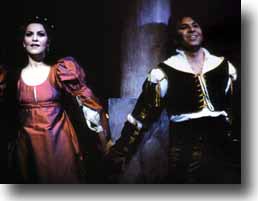REVIEW
Romeo et Juliette, Royal Opera House, February 2000

Romeo gets a French polish
by Tom Sutcliffe, Evening Standard, 2 February 2000
Roberto Alagna's interpretation of Romeo is a perfect demonstration of
why and how "international opera" is something else - the reason for
putting all that money into the Royal Opera House. Since the place
re-opened, other stars have shone here. But Alagna and his wife Angela
Gheorghiu are a different order of magnitude.
This is unquestionably his opera. Her singing technique may be steelier
and more impeccably polished. She looks as immaculate and beautiful as
ever, but touches too briefly on the vulnerability of the young
Juliette. At their farewell tryst, it's more like she might have been
married for years.
We see her curled up on her cramped bed, built in to a beaten-up stage
flat with imperfectly glued wallpaper (later, the scene rises smoothly
into the flies, bed and all). His white shirt billows open. She's in a
rather proper nightie - forced into uncomfortable postures as if they're
sharing a sleeper on an overnight train. Not much girlishness here, just
a lovely, smooth, penetrating, often thrilling vocal display.
The glory of Alagna's Romeo has various elements. His voice has grown
and the visceral force with which it comes off the stage can be
extremely exciting. The clarity of his singing here stems from his total
ease in his native language. The cadences and colours of French
diphthongs are hard for foreigners who usually sound far too mimsy.
Alagna's French is crisp, fresh, forceful, bright and understandable,
and it's one of the ways he lives inside the role.
Physically his manner is perfect for Romeo. He still looks young, and
there's a marvellous gangly feel in his wish not to fight, and then
ferocious energy in his furious attack on Tito Beltran's seriously
lively Tybalt. He's a really good actor as well as singer, his
characterisation organic, never stuck on. He takes expressive vocal
risks.
This Romeo isn't elegantly placed singing all the way through. It's
superbly coloured, daring, full of poetry. The tomb-like darkness at the
bottom of his voice, when he greets Tybalt and is recognised as an enemy intruder, is just wonderful. Alagna's Roméo is uniquely special,
in a class of its own.
I enjoyed Jenny Grahn's cameo as the page Stephano very much, and Sorin
Coliban's rather blustery Capulet had something to him. Charles
Mackerras conducts the score with noble seriousness, more than Gounod's
meretricious calculations deserve, and the Royal Opera orchestra give of
their very best.
This page was last updated on: May 6, 2004